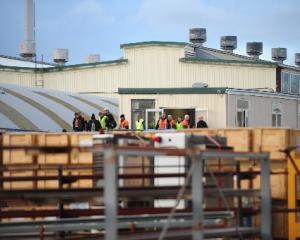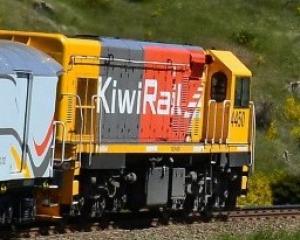The group had survived a major downturn in 2000, when there were fewer than 160 workers employed on site.
Concern among the wider Dunedin business community was around the workshops closing.
Already at that stage, skilled Hillside workers had left for Australia, raising concerns that if there was a revival in the fortunes of the workshops, staff would be hard to find to carry out the work.
But all that changed in 2003, when a financially strapped Tranz Rail was taken over by Toll.
Not everybody was happy about the Australian company taking over Tranz Rail, but at least the workshops started getting work.
Some protracted and fractured negotiations took place between Toll and the Labour government.
By late 2004, the workshops completed 33 new coal wagons worth about $33 million, which Toll was to lease to Genesis Energy. Turnover of the workshops was reported in the Otago Daily Times as increasing from $12 million to $30 million in recent years.
The then finance minister Michael Cullen and Toll NZ chief executive David Jackson were upbeat about the potential for Hillside as there were also opportunities in Australia supplying Toll's other rail and road interests.
Staff numbers increased to 220, including at least 12 apprentices.
Dr Cullen was enthusiastic about the job opportunities for the workshops, which in their heyday had up to 1500 employees.
The workshops then started negotiations to assemble locomotives to replace some of the railway operator's ageing fleet.
Toll had committed about $100 million to maintaining rolling stock after taking over the company.
The peak for the company in recent times was probably 2005, when a rounded performance saw the Hillside Engineering Group being named as the Otago Daily Times Business of the Year.
The group finished the year the same way as it started, winning contracts to build train sets and coal wagons for out-of-town customers.
Asked then how the year went, the group's management team used words such as fantastic, brilliant and satisfying.
Some of the achievements of the year included winning extended contracts with the Auckland Regional Authority to supply train sets for the commuter rail services being expanded in Auckland.
A challenge by the authority for an early delivery saw the management team move forward the delivery date by four weeks for some sets.
To meet the shorter delivery times, the management team looked at all its processes, identifying bottlenecks in production and rearranging the way they worked.
Such was the acceptance of the new systems that the authority decided early in that year to no longer come to Dunedin for on-site acceptance tests.
The Hillside workshops had not been far from the news all of 2005 - whether it was winning contracts worth millions of dollars to build new rail carriages to be used by Wairarapa-Wellington commuters, the new commuter trains for Auckland, coal wagons for Solid Energy, taking on apprentices or two visits by then prime minister Helen Clark.
More than 230 staff worked at Hillside during the year, and the group was training 15 apprentices, some of whom had qualified and were being replaced.
The group won international and national engineering awards - peer recognition for the work being carried out in Dunedin.
Export contracts were making a small but important contribution to the group's work.
A big achievement was winning an internal supply contract because it meant import substitution.
While the product was cheaper to buy in India or China, the quality and delivery time of the product from Hillside secured the deals.



